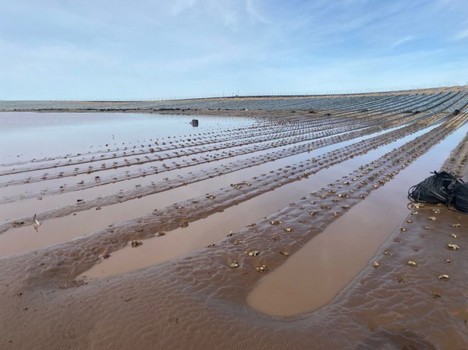Herders in Shimbirey and Saka in Balambala subcounty, Garissa, are counting heavy losses following a night of heavy rainfall that killed dozens of goats and sheep.
The downpour began on Saturday and continued into the early hours of Sunday, flooding low-lying grazing areas and livestock shelters.
Halima Aden, a widowed mother of eight, stood motionless at Gutoy grazing land, staring at the lifeless bodies of 150 goats and sheep—the family's only source of livelihood.
“I really don’t know where to start. When I woke up in the morning, I could not believe what I saw. It was as if I was daydreaming. Losing everything in a night is too much to take. May God give me strength to handle this,” said Halima, a resident of Shimbirey.
“We are used to drought and heat, and we have all along been praying to Allah to give us the much-needed rains. Unfortunately, the rain was too much, and the animals were too weak to withstand the cold."
Another herder, Abdi Suleiman, who lost all his 70 goats and sheep, said that the unfortunate turn of events has rendered him destitute, wondering what the future holds for him and his family.
“For months, our livestock, especially cows, goats, and sheep endured the unforgiving drought, surviving on dry shrubs and brackish water. With the arrival of rain, we dared to dream again. The rain was supposed to be a blessing, but instead, it has brought devastation,” Suleiman said.
Hussein Hassan from Saka, who lost 60 animals, said that the livestock were weakened by months of scarce pasture and water, making them vulnerable to sudden weather changes.
“What began as light showers soon turned violent. When the storm subsided and I went out to check on my animals in their shelter, I could not believe my eyes. Let the government help us because on our own we cannot manage this difficult situation,” he said.
Forty kilometers away in Balambala town, Ahmed Fetin, 80, is equally devastated after losing 200 of his goats and sheep.
Fetin said that he anticipated the heavy rains would be a blessing for his goats, but weakened by the prolonged dry spell, his stock lacked the resilience to withstand the stress brought on by the heavy rains.
"After the heavy night rain, what I witnessed in the morning was shocking. My goats that were in a fenced boma were all carcasses; only a few survived. They were shivering and unable to stand until the sunlight brought hope," he said.
Abdi Suleiman, a former Sankuri MCA who visited the families, said the losses were not just personal but symbolic of the fragility of pastoral life in Northern Kenya.
"These animals were their bank, their food, their life. Losing them means starting from zero. I want to make a passionate appeal to well-wishers, the county government, and the national government to help the devastated families,” Suleiman said.
Garissa county has endured a string of climate shocks—drought, flash floods, and extreme heat—all of which have stretched rural communities to their limits.
The recent rains, while welcomed after months of drought, have unleashed unexpected hazards of livestock death and flash floods. Experts say the incidents are becoming more frequent due to erratic weather patterns linked to climate change.
INSTANT ANALYSIS
The Garissa livestock tragedy highlights the deepening vulnerability of pastoralist communities to climate extremes. Once-prized rains have become double-edged—offering relief after drought but unleashing floods that wipe out already weakened herds. The losses in Shimbirey and Saka expose how fragile rural livelihoods have become amid erratic weather linked to climate change. Without adaptive measures such as improved shelters, livestock insurance, and early warning systems, herders remain trapped in a cycle of recovery and loss. The disaster underscores the urgency for climate-resilient policies and stronger local support systems to protect livelihoods that form the backbone of northern Kenya’s economy.
Source - https://www.the-star.co.ke













